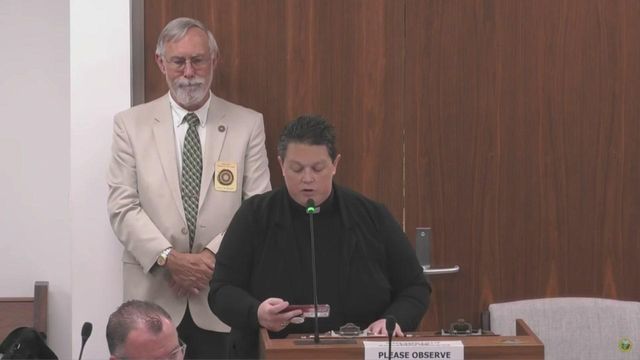Editorial: Federal Rescue funds pumped state economy and N.C. revenues

CBC Editorial: Wednesday, Feb. 2, 2022; Editorial #8733
The following is the opinion of Capitol Broadcasting Company
Imagine the scene: President Joe Biden and Vice President Kamala Harris show up for a photo opportunity in front of the North Carolina legislative building to present an oversized check for $8.8 billion – the state’s share of federal American Rescue Plan funds -- to Gov. Roy Cooper.
The howls of outrage from state legislative leaders would have the Capitol Press Corps scurrying for their mobile recording devices to capture it all.
But the truth is, more than anything else, it has been the billions of federal dollars streaming into North Carolina – helping families put food on the table, pay for health and childcare, keep schools open, support out-of-job workers, help employers keep employees on staff and aid with other education and daily costs – that kept North Carolina’s economy stable.
Not only did these federal programs keep the state’s economy from tanking – they positioned it for a rapid recovery and provided a huge boost in state tax revenues. Those additional funds, along with the massive aid from Washington, are what has enabled North Carolina’s legislators to trot around the state with THEIR oversized checks, acting like prize-show hosts and posing with oversized checks at local government and community-agency gatherings.
A look at the latest state revenue figures through December, just released by the State Controller’s Office, make the impact clear. Much of the federal relief aid that went to North Carolinians was spent on the goods and services they needed. A portion of that money went into the state treasury in the form of taxes and fees.
For the last six months – July through December, sales tax collections increased 25% over the year before – three times the rate of increase for the same period a year earlier (see charts below).
A comparison look at the state’s last three fiscal years (which run from July 1 through June 30) paints an even more vivid picture. State sales tax revenues DROPPED in the 2019-2020 fiscal year 14% but had a HUGE rebound in the 2020-2021 fiscal year increasing 15%. Personal income taxes dropped 6% a year ago, but in the just completed fiscal year increased 28%.
All that meant a healthier economy for North Carolina and more money in North Carolina’s state treasury.
So, if North Carolina legislators are looking for opportunities to offer praise for the state’s rapid economic recovery they need look no further than Washington – to U.S. Representatives Alma Adams, G.K. Butterfield, Kathy Manning, David Price and Deborah Ross -- to thank for voting for the Rescue Plan offered up by President Biden.
State legislators didn’t get any help from our senators, Richard Burr, Thom Tillis, nor from representatives Dan Bishop, Ted Budd, Madison Cawthorn, Virginia Foxx, Richard Hudson, Patrick McHenry, Greg Murphy and David Rouser – who all voted against it.
So, it might be more honest as North Carolina legislators trot around the state with their giant checks – for them to give credit where it is really due – to those in Washington who voted for and REALLY sent the billions to North Carolina that sparked the state’s economic revival and pumped more billions back into the state’s treasury.
| TAXES | FY 2021 | FY 2020 | FY 2019 |
| Corporate Income | $1.511 billion (+130%) | $657.8 million (-21%) | $830.5 million |
| Personal Income | $15.823 billion (+28%) | $12.415 billion (-6%) | $13.166 billon |
| Sales-Use | $9.024 billion (+15%) | $7.021 billion (-14%) | $7.712 billion |
NOTE: N.C. Fiscal year runs from July through June FY2021 – July 2020-June 2021; FY 2020 – July 2019-June 2020; FY 2019 – July 2019 -June 2020. Source, Office of the State Controller
| TAXES | Half-Year 2022 | Half-Year 2021 | Half-Year 2020 |
| Corporate Income | $490 million (+25%) | $465 million (+113%) | $218 million |
| Personal Income | $7.234 billion (+2%) | $7.121 billion (+19%) | $5.944 billion |
| Sales-Use | $5.598 billion (+25%) | $4.466 billion (+7%) | $4.192 billion |
NOTE: N.C. Fiscal Year starts July 1. 2022 Half-year is July 1, 2021 through Dec. 31, 2021; 2021 Half-year is July 1, 2020 through Dec. 31, 2020; 2020 Half-year is July 1, 2019 through Dec. 31, 2019. Source, Office of the State Controller
| TAXES | DEC, 2021 | DEC. 2020 | DEC. 2019 |
| Corporate Income | $289.6 million (+27%) | $228.8 million (+32%) | $173.0 million |
| Personal Income | $1.50 billion (+21%) | $1.24 billion (+12%) | $1.11 billion |
| Sales-Use | $859.2 million (+36%) | $632.2 million (+4%) | $608.7 million |
Source, office of the State Controller









